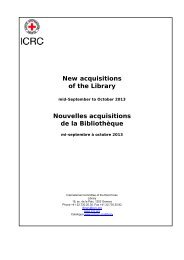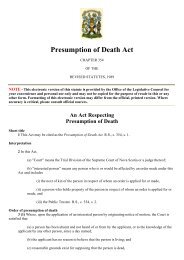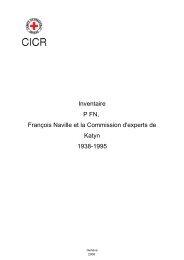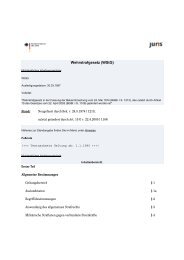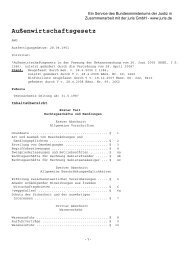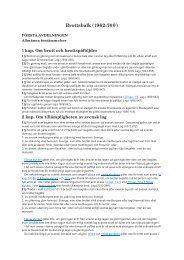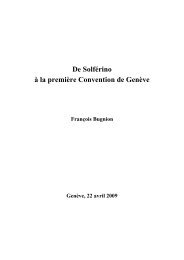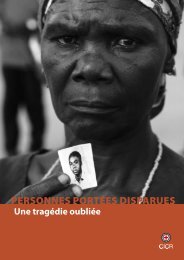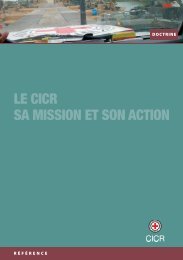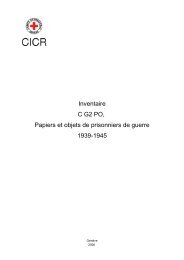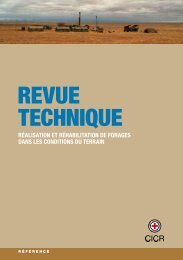Alfred Bernhard Nobel and the Peace Prize, Alfred Bernhard ... - ICRC
Alfred Bernhard Nobel and the Peace Prize, Alfred Bernhard ... - ICRC
Alfred Bernhard Nobel and the Peace Prize, Alfred Bernhard ... - ICRC
You also want an ePaper? Increase the reach of your titles
YUMPU automatically turns print PDFs into web optimized ePapers that Google loves.
y<br />
Peter <strong>Nobel</strong><br />
RICR Juin IRRC June 2001 Vol. 83 N o 842 259<br />
<strong>Alfred</strong> <strong>Bernhard</strong> <strong>Nobel</strong> <strong>and</strong> <strong>the</strong><br />
<strong>Peace</strong> <strong>Prize</strong><br />
<strong>Alfred</strong> <strong>Nobel</strong> died on 10 December 1896. His last will <strong>and</strong><br />
testament is dated 27 November 1895.This famous document<br />
is drafted in Swedish <strong>and</strong> includes inter alia <strong>the</strong> following<br />
provisions:<br />
“…one part [one fifth of <strong>the</strong> annual returns on <strong>the</strong> assets of <strong>the</strong><br />
Foundation] [shall be apportioned] to <strong>the</strong> person who shall have done<br />
<strong>the</strong> most or <strong>the</strong> best work for fraternity between nations, for <strong>the</strong> abolition<br />
or reduction of st<strong>and</strong>ing armies <strong>and</strong> for <strong>the</strong> holding <strong>and</strong> promotion<br />
of peace congresses. (...)<br />
The prize (...) for champions of peace (...) [shall be awarded] by a<br />
committee of five persons to be elected by <strong>the</strong> Norwegian Storting.<br />
It is my express wish that in awarding <strong>the</strong> prizes no consideration<br />
whatever shall be given to <strong>the</strong> nationality of <strong>the</strong> c<strong>and</strong>idates, but that<br />
<strong>the</strong> most worthy shall receive <strong>the</strong> prize, whe<strong>the</strong>r he be a Sc<strong>and</strong>inavian<br />
or not.” 1<br />
The will is a remarkable document in many respects,<br />
considering that it was written at a time when nationalism was at<br />
its peak. As we shall see, it was certainly a provocation to Swedish<br />
national feelings at <strong>the</strong> time.<br />
Peter <strong>Nobel</strong> is a descendant of <strong>Alfred</strong> <strong>Nobel</strong>'s bro<strong>the</strong>r Ludvig <strong>Nobel</strong>. He was<br />
Sweden's first Ombudsman against Ethnic Discrimination (1986-1991) <strong>and</strong><br />
Secretary-General of <strong>the</strong> Swedish Red Cross (1991-1994). — Unless stated<br />
o<strong>the</strong>rwise, translations of quotations into English are by <strong>the</strong> author.
260 Centenaire du Prix <strong>Nobel</strong> de la Paix – Centenary of <strong>the</strong> <strong>Nobel</strong> <strong>Peace</strong> <strong>Prize</strong><br />
<strong>Alfred</strong> <strong>Nobel</strong> was not a happy person. His many private<br />
letters confirm <strong>the</strong> picture of a lonely, ascetic man in bad health, burdened<br />
with work <strong>and</strong> hypochondria. He was a man of high morals,<br />
often helpful but never showing off. He shunned high society, <strong>and</strong><br />
ridiculed vanity <strong>and</strong> outward fineries. Politically <strong>and</strong> in religious issues,<br />
he was a radical. He considered himself a social democrat. He was<br />
fluent in five languages <strong>and</strong> was often drastically outspoken. His relatives<br />
remembered him as a warm-hearted uncle, generous, <strong>and</strong><br />
thoughtful in his choice of gifts. He appreciated a joke <strong>and</strong> enjoyed a<br />
good meal. Sometimes he expressed envy at <strong>the</strong> harmonious family<br />
life of his bro<strong>the</strong>rs.<br />
I shall dwell on two questions:Why did <strong>the</strong> donator institute<br />
a peace prize <strong>and</strong> why was it to be awarded by a body of <strong>the</strong><br />
Parliament of Norway, whereas <strong>the</strong> o<strong>the</strong>r prizes were entrusted to<br />
non-political Swedish institutions? These questions have given rise to<br />
much speculation.There are a few clues that may help to draw convincing<br />
conclusions.<br />
The wars<br />
<strong>Alfred</strong> <strong>Nobel</strong> lived in an era when terrible wars of appalling<br />
cruelty were fought between nations that called <strong>the</strong>mselves civilized.<br />
The suffering caused by those wars cried out for humanitarian<br />
action. The Crimean War lasted for three years. from 1853 to 1856.<br />
During it <strong>the</strong> humanitarian work pioneered by Florence Nightingale<br />
diminished <strong>the</strong> suffering <strong>and</strong> saved <strong>the</strong> lives of many wounded British<br />
soldiers. France under Napoleon III attacked <strong>the</strong> Austrians <strong>and</strong> defeated<br />
<strong>the</strong>m in <strong>the</strong> bloody battles of Magenta <strong>and</strong> Solferino in 1859.The<br />
young Henry Dunant described <strong>the</strong> horrors of Solferino in one of <strong>the</strong><br />
most moving works of war journalism that has ever been written <strong>and</strong><br />
thus prompted <strong>the</strong> founding of <strong>the</strong> Red Cross.The American Civil War<br />
went on for four years, from 1861 to 1865. Prussia, led by Bismark,<br />
waged wars with Denmark, Austria <strong>and</strong> Italy, <strong>and</strong> in 1870-71 with<br />
1 The relevant part of <strong>Alfred</strong> <strong>Nobel</strong>'s will<br />
has been incorporated in <strong>the</strong> Statutes of <strong>the</strong><br />
<strong>Nobel</strong> Foundation (§ 1), .
RICR Juin IRRC June 2001 Vol. 83 N o 842 261<br />
France. Yet ano<strong>the</strong>r war was fought between Russia <strong>and</strong> Turkey in<br />
1877-78. It is enough to mention just some of <strong>the</strong> major wars.Towards<br />
<strong>the</strong> end of that century, European imperialism culminated in <strong>the</strong> colonization<br />
of non-European countries, often with ruthless brutality. No<br />
wonder that States maintained big st<strong>and</strong>ing armies <strong>and</strong> that every generation<br />
of Europeans expected war during <strong>the</strong>ir lifetime. Many young<br />
men, in particular those of <strong>the</strong> aristocracy, believed that to die on a<br />
battlefield was glorious <strong>and</strong> thought <strong>the</strong> military profession honourable.<br />
That certainly was not <strong>the</strong> view of <strong>Alfred</strong> <strong>Nobel</strong>. In a letter<br />
to one of his bro<strong>the</strong>rs, rejecting <strong>the</strong> idea that he should write down<br />
his biographical data, he said: “…No one reads articles about persons<br />
o<strong>the</strong>r than actors <strong>and</strong> murderers, preferably <strong>the</strong> latter, whe<strong>the</strong>r <strong>the</strong>y<br />
have performed <strong>the</strong>ir deeds on <strong>the</strong> battlefield or indoors in a manner<br />
to make people gape.” 2<br />
A man of peace after all<br />
From his youth <strong>Alfred</strong> <strong>Nobel</strong> was seriously interested in<br />
literature <strong>and</strong> pacifism. He was well informed about world events of<br />
<strong>the</strong> time, ideas <strong>and</strong> philosophy. He was also well read, particularly in<br />
French <strong>and</strong> English literature.The politically radical <strong>and</strong> pacifist writings<br />
of Percy B. Shelley (1792-1822) in many respects reflected his<br />
own thinking. In a letter to a Belgian pacifist, he described his dream<br />
of a world at peace in terms of classical allegories. He continued:“The<br />
more I hear of <strong>the</strong> thunder of <strong>the</strong> cannon, <strong>the</strong> more blood I see shed,<br />
plundering being legalized <strong>and</strong> <strong>the</strong> gun sanctioned, <strong>the</strong> more alive <strong>and</strong><br />
intensive becomes this dream of mine.” At <strong>the</strong> same time he wrote to<br />
an English friend, a clergyman, that he harboured “a serious wish to<br />
see a rose-red peace grow up in this explosive world.” 3 <strong>Alfred</strong> <strong>Nobel</strong><br />
abhorred violence <strong>and</strong> conflict.<br />
Never<strong>the</strong>less, for most of his life he was involved in developing<br />
<strong>and</strong> producing explosives <strong>and</strong> ammunition. At <strong>the</strong> outbreak of<br />
<strong>the</strong> Crimean War, after a long study trip to Western Europe <strong>and</strong> <strong>the</strong><br />
United States, he returned to his fa<strong>the</strong>r’s laboratory in St Petersburg.<br />
2 Ragnar Sohlman, Ett testamente,<br />
Stockholm, 1950, p. 30.<br />
3 Sven Tägil, “Krig och fred i <strong>Alfred</strong> <strong>Nobel</strong>s<br />
föreställningsavärld”, in John Rosén (ed.),<br />
<strong>Alfred</strong> <strong>Nobel</strong>, hans far och hans bröder,<br />
Stockholm, 1995, pp. 77-90.
262 Centenaire du Prix <strong>Nobel</strong> de la Paix – Centenary of <strong>the</strong> <strong>Nobel</strong> <strong>Peace</strong> <strong>Prize</strong><br />
There he worked <strong>and</strong> experimented toge<strong>the</strong>r with his two elder bro<strong>the</strong>rs<br />
Robert <strong>and</strong> Ludvig <strong>Nobel</strong>.The <strong>Nobel</strong>s contributed significantly<br />
to <strong>the</strong> naval defence of Russia against <strong>the</strong> threat of <strong>the</strong> British Navy by<br />
<strong>the</strong>ir invention of underwater mines, which was put to effective practical<br />
use. Indeed, <strong>the</strong> British admiral Sir Charles Napier explained his<br />
partial failures in <strong>the</strong> Gulf of Finl<strong>and</strong> by stating that it “was full of<br />
infernal machines”. In a letter to a friend, <strong>Alfred</strong> complained that he<br />
was doing more work for <strong>the</strong> “Tsar than for God”. Later his fa<strong>the</strong>r,<br />
Immanuel <strong>Nobel</strong>, published a magnificent work about <strong>the</strong> invention,<br />
including his own water-colour illustrations <strong>and</strong> explanations in<br />
French most probably written by <strong>Alfred</strong> himself: “Système de défence<br />
maritime pour passages et ports sans fortifications dispendieuses et avec épargne<br />
d'hommes”.A defensive system to save <strong>the</strong> lives of <strong>the</strong> defenders!<br />
The methods for <strong>the</strong> use of dynamite developed by <strong>Alfred</strong><br />
<strong>Nobel</strong> were for civilian purposes <strong>and</strong> made possible enormous projects<br />
such as <strong>the</strong> Suez Canal <strong>and</strong> <strong>the</strong> Panama Canal, or <strong>the</strong> railroad passage<br />
through <strong>the</strong> Swiss Alps (Gotthard Tunnel). However, according to<br />
hearsay <strong>the</strong> Germans used dynamite in <strong>the</strong> war of 1870 against France.<br />
In 1887 he applied for a patent for his new <strong>and</strong> more<br />
complicated product which revolutionized <strong>the</strong> military technology of<br />
explosives. It was a new powder much more powerful than <strong>the</strong> previous<br />
one <strong>and</strong> almost free of <strong>the</strong> smoke which frequently blinded<br />
combatants in <strong>the</strong> old days. It was named ballistite (in Swedish<br />
<strong>Nobel</strong>krut). 4<br />
Then in 1894 he bought a gun factory, Bofors, in Western<br />
Sweden. One of his goals was to obtain better conditions for experiments<br />
with new explosives <strong>and</strong> guns than those available in San<br />
Remo, where he had his home during <strong>the</strong> latter years of his life.<br />
<strong>Nobel</strong> observed that <strong>the</strong>se factories offered excellent opportunities<br />
which it would have been a pity to waste. He also expressed <strong>the</strong> view<br />
that a national defence necessitated a national defence industry.<br />
Fur<strong>the</strong>rmore he envisioned that <strong>the</strong> Swedish arms industry under his<br />
management would be able to compete in <strong>the</strong> international market<br />
with those of Engl<strong>and</strong> <strong>and</strong> Germany. At <strong>the</strong> same time he dissociated<br />
4 Svenskt biografiskt lexikon, Bind 27.131,<br />
p. 106.
RICR Juin IRRC June 2001 Vol. 83 N o 842 263<br />
himself from o<strong>the</strong>r arms producers. Referring to <strong>the</strong>m, he once wrote<br />
to a friend: “I wish a new Mephisto might turn up <strong>and</strong> enrich hell<br />
with <strong>the</strong>se evildoers.” 5 Obviously he saw his own motives as those of<br />
an inventor <strong>and</strong> <strong>the</strong>refore different from those of arms producers.<br />
This is a classic dilemma well known to all those who<br />
hope <strong>and</strong> work for peace <strong>and</strong> at <strong>the</strong> same time believe that as things<br />
st<strong>and</strong>, maintaining a national defence is inevitable. It brings to my<br />
mind a statement in a lecture given by a high-ranking officer: “A<br />
national defence preconditions a national defence industry, but too<br />
heavy an arms industry limits <strong>the</strong> freedom of action of <strong>the</strong> State.” In<br />
his view, keeping up <strong>the</strong> competitive quality of <strong>the</strong> defence industry<br />
requires research <strong>and</strong> development, which in turn requires arms<br />
exports to guarantee profitability. Importing countries <strong>the</strong>n often<br />
dem<strong>and</strong>, on grounds of reciprocity, to export <strong>the</strong> weaponry <strong>the</strong>y<br />
<strong>the</strong>mselves produce to <strong>the</strong>ir counterparts. Thus a dangerous spiral is<br />
easily developed when a proper balance is not achieved.<br />
While <strong>Alfred</strong> <strong>Nobel</strong>, particularly in his later years,<br />
undoubtedly was involved in developing <strong>and</strong> manufacturing advanced<br />
explosives <strong>and</strong> weapons, <strong>the</strong>re is no indication that his dream of peace<br />
faded or disappeared. The occasional tentative assumption that he<br />
donated <strong>the</strong> peace prize because of a bad conscience is not supported<br />
by evidence.Therefore we do not know for sure whe<strong>the</strong>r it is correct<br />
or not. His personality was complicated <strong>and</strong> thus defies any oversimplified<br />
analysis.What we do know is that he did believe in <strong>the</strong> deterrent<br />
effect of modern weapons of destruction <strong>and</strong> in what came to be<br />
known, long after his day <strong>and</strong> age, as <strong>the</strong> “balance of terror”.<br />
These views were often expressed in his extensive correspondence<br />
with <strong>the</strong> Austrian pacifist Bertha von Suttner. It is important<br />
to remember that <strong>Alfred</strong> <strong>Nobel</strong> was himself a pacifist before he met her.<br />
However, <strong>the</strong> exchange of ideas between <strong>the</strong>m <strong>and</strong> <strong>the</strong>ir differences in<br />
opinion towards <strong>the</strong> end of his life, not about goals but about ways <strong>and</strong><br />
means, may well have influenced his thinking <strong>and</strong> <strong>the</strong> wording of his<br />
last will.<br />
5 Ibid. About <strong>the</strong> years in San Remo see<br />
Giovanni Lotti, <strong>Nobel</strong> a San Remo, San Remo,<br />
1980.
264 Centenaire du Prix <strong>Nobel</strong> de la Paix – Centenary of <strong>the</strong> <strong>Nobel</strong> <strong>Peace</strong> <strong>Prize</strong><br />
The role of Bertha von Suttner<br />
In <strong>the</strong> spring 1876 <strong>Alfred</strong> <strong>Nobel</strong>, <strong>the</strong>n aged 42, published<br />
<strong>the</strong> following advertisement in a Vienna journal:<br />
“A very rich, highly educated elderly gentleman, living in Paris,<br />
seeks a lady likewise of a mature age, with a good knowledge of<br />
languages, as secretary <strong>and</strong> to be responsible for <strong>the</strong> household.”<br />
It was answered by an Austrian Countess, Bertha Kinsky von Chinic<br />
und Tettau. She was at that time nearing her 33rd birthday <strong>and</strong><br />
engaged to Baron Arthur von Suttner.This engagement <strong>and</strong> relationship<br />
was kept a secret because her aristocratic family considered it an<br />
unacceptable mésalliance.<br />
After an exchange of letters Bertha Kinsky visited Paris,<br />
where she was well received by <strong>Alfred</strong> <strong>Nobel</strong>. Both enjoyed <strong>the</strong>ir correspondence<br />
<strong>and</strong> conversations, but after only a week she suddenly left<br />
Paris. She <strong>the</strong>n married her fiancé, whereupon <strong>the</strong> Von Suttners lived<br />
in a sort of exile in <strong>the</strong> Caucasus for almost ten years before a reconciliation<br />
with her family made <strong>the</strong>ir return to Austria possible. During<br />
<strong>the</strong>ir Caucasian years Arthur von Suttner became a skilful photographer,<br />
while his wife developed into an author good enough to win<br />
recognition <strong>and</strong> success. She was also a fervent pacifist.Through all <strong>the</strong><br />
years Bertha <strong>and</strong> <strong>Alfred</strong> continued <strong>the</strong>ir correspondence. Some writers<br />
have insinuated that Bertha fled from Paris in order to avoid obtrusive<br />
attentions on <strong>the</strong> part of <strong>Alfred</strong>, but such behaviour would be entirely<br />
uncharacteristic of his reserved <strong>and</strong> controlled manner. Nor have such<br />
insinuations been supported by quotations from Bertha’s memoirs.<br />
Ra<strong>the</strong>r she obeyed <strong>the</strong> dictates of her heart <strong>and</strong> her compassion, as<br />
according to one of her biographers Arthur von Suttner was consumed<br />
by jealousy during her stay in Paris. 6<br />
Although <strong>the</strong> issues of peace or war were certainly<br />
touched upon from <strong>the</strong> beginning of <strong>the</strong>ir dialogue, it was only after<br />
publication of her novel Die Waffen nieder! (Down with Arms) in 1889<br />
that <strong>the</strong>y were more systematically addressed in <strong>the</strong>ir correspondence.<br />
But <strong>Alfred</strong> <strong>Nobel</strong>´s first letter congratulating her was only polite.<br />
Later his tone was sadly ironic. This was in September 1891, when<br />
6 Marianne Wintersteiner, Die Baronin<br />
Bertha von Suttner, Wien, 1984, p. 106.
RICR Juin IRRC June 2001 Vol. 83 N o 842 265<br />
Bertha von Suttner had published an enthusiastic appeal against war<br />
<strong>and</strong> rearmament. <strong>Nobel</strong> responded, this time in English:<br />
“Delighted I am to see, that your eloquent pleading against that<br />
horror of horrors, war, has found its way into <strong>the</strong> French press.<br />
But I fear that out of French readers ninety-nine in a hundred<br />
are chauvinistically mad.The Government here is almost in <strong>the</strong>ir<br />
senses; <strong>the</strong> people on <strong>the</strong> contrary is getting success — <strong>and</strong><br />
vanity drunk. A pleasant kind of intoxication, much less delirious<br />
— unless it leads to war — than spirits of wine <strong>and</strong> morphium!<br />
And your pen? Whi<strong>the</strong>r is it w<strong>and</strong>ering now? After writing<br />
with <strong>the</strong> blood of <strong>the</strong> martyrs of war will it show us<br />
<strong>the</strong> prospect of a future fairy-l<strong>and</strong> or <strong>the</strong> less utopian picture<br />
of <strong>the</strong> thinkers’ commonwealth? My sympathies are in that<br />
direction, but my thoughts are mostly w<strong>and</strong>ering towards ano<strong>the</strong>r<br />
commonwealth, where silenced souls are misery-proof.” 7<br />
A few weeks later that year she approached <strong>Alfred</strong> <strong>Nobel</strong><br />
for a financial contribution to <strong>the</strong> peace propag<strong>and</strong>a campaign. He<br />
sent a sum of money but also a critical letter, this time in French:<br />
“Ce n’est pas l’argent, je crois, mais le programme qui fait défaut. Les<br />
vœux seuls n’assurent pas la paix. On peut en dire autant de gr<strong>and</strong>s<br />
diners avec gr<strong>and</strong> discours. Il faudrait pouvoir présenter aux gouvernements<br />
bien-intentionnés un projet acceptable. Dem<strong>and</strong>er le désarmement,<br />
c’est presque se rendre ridicule sans profit pour personne.<br />
Dem<strong>and</strong>er la constitution immédiate d´un tribunal d´arbitrage, c’est se<br />
heurter à mille préjugés et fair un obstructeur de tout ambitieux. Il faudrait<br />
pour réussir se contenter de commencements plus modestes…<br />
[Here <strong>the</strong> letter suggests concrete examples of short-term, step<br />
by step measures considered as more realistic by its author who<br />
continues:] Ce sera alors seulement qu’on pourra utilement songer à<br />
procéder peu à peu au désarmenent que désirent tous les honnêtes gens et<br />
presque tous les gouvernements. Et supposez que malgré tout une querelle<br />
éclate entre deux gouvernements: ne pensez-vous pas qu’ils se calmeront<br />
neuf fois sur dix durant l’armistice obligatoire qu’ils auraient à subir ?” 8<br />
7 On <strong>Alfred</strong> <strong>Nobel</strong> <strong>and</strong> <strong>the</strong> peace movement<br />
see <strong>Alfred</strong> <strong>Nobel</strong> och hans släkt,<br />
Memorial Publication by <strong>the</strong> <strong>Nobel</strong><br />
Foundation, Stockholm, 1926, pp. 216-229.<br />
8 Ibid. — “To my mind, what is wanting is<br />
not money but <strong>the</strong> programme itself. Wishes
266 Centenaire du Prix <strong>Nobel</strong> de la Paix – Centenary of <strong>the</strong> <strong>Nobel</strong> <strong>Peace</strong> <strong>Prize</strong><br />
In August 1892 a peace congress convened in Berne,<br />
Switzerl<strong>and</strong>. Bertha von Suttner was one of <strong>the</strong> key people <strong>the</strong>re.<br />
<strong>Alfred</strong> <strong>Nobel</strong> turned up, but left again without having really participated.<br />
I cannot help feeling that his hearing must have been affected by<br />
many years of experimentation with explosives. Trying to listen to<br />
speeches at <strong>the</strong> conference may not have been very rewarding, <strong>and</strong><br />
<strong>the</strong>re were no audio-visual aids in those days. Anyway, <strong>Alfred</strong> <strong>Nobel</strong><br />
<strong>and</strong> Bertha von Suttner met shortly afterwards in Zurich. He is said to<br />
have told her:“My factories may put an end to war sooner than your<br />
congresses. The very day when two army corps can annihilate each<br />
o<strong>the</strong>r within one second, would not all civilized nations shrink back<br />
from a war <strong>and</strong> dismiss <strong>the</strong>ir troops?”<br />
That was <strong>the</strong> last meeting between Bertha von Suttner<br />
<strong>and</strong> <strong>Alfred</strong> <strong>Nobel</strong>. In 1905 she was awarded <strong>the</strong> <strong>Peace</strong> <strong>Prize</strong>.<br />
<strong>Alfred</strong> <strong>Nobel</strong> takes action<br />
After <strong>the</strong> Berne conference <strong>Nobel</strong> decided to act on his<br />
own. He employed an experienced Turkish ex-diplomat, Aristarchi<br />
Bey, to keep him informed about <strong>the</strong> peace work in Europe <strong>and</strong>, as his<br />
representative, to actively support it through <strong>the</strong> press <strong>and</strong> in various<br />
ga<strong>the</strong>rings. <strong>Nobel</strong>’s exchange of ideas with <strong>the</strong> politically well-versed<br />
Aristarchi influenced his thinking in an even more realistic direction.<br />
He developed a plan for a “League of Peoples”, <strong>the</strong>reby rejecting <strong>the</strong><br />
idea of an international tribunal, as <strong>the</strong> execution of any such body’s<br />
decision would require armed forces. Bertha von Suttner was not<br />
impressed. She wrote, in German:“Your last letter describes <strong>the</strong> doubts<br />
alone do not ensure peace. The same can be<br />
said of gr<strong>and</strong>iose dinners with gr<strong>and</strong>iose<br />
speeches. There would have to be an acceptable<br />
project that can be submitted to wellintentioned<br />
governments. To call for disarmament<br />
is virtually to make oneself ridiculous<br />
without helping anyone. To call for <strong>the</strong> immediate<br />
constitution of a court of arbitration<br />
means having to contend with a thous<strong>and</strong><br />
forms of prejudice <strong>and</strong> turning anyone ambitious<br />
against it. In order to succeed, you<br />
would have to make do with a more modest<br />
start. [...] Only <strong>the</strong>n would a gradual advance<br />
towards <strong>the</strong> disarmament that all decent<br />
people <strong>and</strong> almost all governments desire be<br />
conceivable. And what if a dispute none<strong>the</strong>less<br />
flares between two governments: do you<br />
not think that nine times out of ten <strong>the</strong>y will<br />
calm down during <strong>the</strong> compulsory armistice<br />
which <strong>the</strong>y would have to observe?” (<strong>ICRC</strong><br />
translation)
RICR Juin IRRC June 2001 Vol. 83 N o 842 267<br />
of your Turkish friend concerning <strong>the</strong> feasibility of courts of arbitration.These<br />
doubts are well known to us “peace professionals” <strong>and</strong> your<br />
refutation is…refuted(!)” — Aristarchi Bey’s employment contract was<br />
terminated after only one year, although <strong>Alfred</strong> <strong>Nobel</strong> liked him.<br />
<strong>Alfred</strong> <strong>Nobel</strong> often stated that mere manifestations of<br />
good will are not enough. His mind worked in terms of concepts such<br />
as prolonged armistices, partial disarmament <strong>and</strong> moratoria, as well as<br />
formalized conflict management. He emphasized <strong>the</strong> necessity of fighting<br />
not just war but poverty, prejudice, intolerance, injustice <strong>and</strong> dishonesty<br />
as well. He maintained, however, that <strong>the</strong> most effective way<br />
to prevent war would be joint military action against a nation that violated<br />
peace.<br />
<strong>Alfred</strong> <strong>Nobel</strong> was incredibly rich. His financial empire<br />
included factories <strong>and</strong> companies in more than 90 countries on three<br />
continents. He turned his mind to how this enormous fortune could<br />
best be put to use for <strong>the</strong> benefit of mankind. In a letter to Bertha von<br />
Suttner in January 1893 he mentions plans to institute a peace prize.<br />
The outcome of <strong>the</strong>m is well known.There were previous wills, one<br />
of which was dated 14 March 1893. It is interesting to compare that<br />
document with <strong>the</strong> final one. According to <strong>the</strong> earlier version, 37 per<br />
cent of <strong>the</strong> property left by him should go to a number of relatives <strong>and</strong><br />
friends <strong>and</strong> to a few institutions, among <strong>the</strong>m <strong>the</strong> Österreichische<br />
Gesellschaft der Friedensfreunde (Austrian Society of Friends of <strong>Peace</strong>) in<br />
Vienna,“to be used for <strong>the</strong> promotion of peace initiatives”.The remaining<br />
<strong>and</strong> larger part should go to <strong>the</strong> Academy of Sciences in<br />
Stockholm, of which <strong>Alfred</strong> <strong>Nobel</strong> was a member. The annual dividends<br />
were to be distributed as awards for <strong>the</strong> most important <strong>and</strong> pioneering<br />
discoveries or intellectual works “…within <strong>the</strong> wide domain<br />
of knowledge <strong>and</strong> progress.Without making an absolute condition, it<br />
is my wish that one should particularly consider those who, through<br />
<strong>the</strong>ir writs or actions, can succeed in combating <strong>the</strong> peculiar prejudice<br />
still harboured both by nations <strong>and</strong> by governments against <strong>the</strong> establishment<br />
of a European peace tribunal.”<br />
If we compare this text with <strong>the</strong> final will cited at <strong>the</strong><br />
beginning of this paper, we shall see among o<strong>the</strong>r changes that <strong>the</strong><br />
reference to a European peace tribunal was dropped, as well as most of
268 Centenaire du Prix <strong>Nobel</strong> de la Paix – Centenary of <strong>the</strong> <strong>Nobel</strong> <strong>Peace</strong> <strong>Prize</strong><br />
<strong>the</strong> bequests to relatives <strong>and</strong> o<strong>the</strong>r individuals. It is also clear that <strong>the</strong><br />
provision m<strong>and</strong>ating <strong>the</strong> Norwegian Parliament to award <strong>the</strong> special<br />
peace prize came at a later stage.Why?<br />
The Norwegian-Swedish Union<br />
For centuries Norway had been a part of <strong>the</strong> Kingdom of<br />
Denmark. In 1810 <strong>the</strong> Swedish Parliament elected a French general<br />
<strong>and</strong> marshal, Jean-Baptiste Bernadotte, heir to <strong>the</strong> Swedish throne. He<br />
<strong>the</strong>n became Crown Prince Karl Johan <strong>and</strong> <strong>the</strong> founder of <strong>the</strong> present<br />
royal dynasty in Sweden. Swedish troops under Karl Johan’s comm<strong>and</strong><br />
had joined <strong>the</strong> victorious forces in <strong>the</strong> battle of Leipzig in 1813 where<br />
Napoleon was defeated. Karl Johan <strong>the</strong>n turned north <strong>and</strong> in two swift<br />
campaigns conquered Norway. The latter campaign took place in<br />
1814; it was <strong>the</strong> last time that Sweden was involved in war. It could be<br />
said that <strong>the</strong> successful French warrior brought Norway as a wedding<br />
gift to his Swedish bride, but no one asked <strong>the</strong> Norwegians how <strong>the</strong>y<br />
felt about it.According to <strong>the</strong> peace treaties, Norway formed a union<br />
with Sweden under <strong>the</strong> Swedish king but under <strong>the</strong> rule of its own<br />
parliament <strong>and</strong> laws. However, disputes developed between <strong>the</strong> two<br />
parts of <strong>the</strong> Union. The crisis took a very serious turn in 1895, that<br />
same year in which <strong>Alfred</strong> <strong>Nobel</strong> drew up his final will.<br />
Contention arose inter alia about influence on foreign<br />
policy <strong>and</strong> representation, division of economic burdens <strong>and</strong> <strong>the</strong> independence<br />
of <strong>the</strong> Norwegian Parliament (Stortinget).This assembly had<br />
been overruled by its counterpart in Stockholm. Celebrated for his<br />
firm position towards <strong>the</strong> Norwegians, <strong>the</strong> Swedish King Oscar II<br />
commissioned a secret committee composed only of conservatives<br />
who favoured a hard line.They recommended that <strong>the</strong> Union be kept<br />
intact <strong>and</strong> unchanged <strong>and</strong> that <strong>the</strong> military budget be increased.The<br />
Swedish Parliament (Riksdagen) acted accordingly. Years of tension <strong>and</strong><br />
difficulties <strong>the</strong>n followed <strong>and</strong> <strong>the</strong>re were more than a few people on<br />
both sides who not only hoped but actively prepared for a fratricidal<br />
war between Norwegians <strong>and</strong> Swedes. Finally, in 1905, Norway unilaterally<br />
dissolved <strong>the</strong> Union. Sweden accepted <strong>the</strong> fait accompli without<br />
waging a war.
RICR Juin IRRC June 2001 Vol. 83 N o 842 269<br />
<strong>Alfred</strong> <strong>Nobel</strong> of course knew what <strong>the</strong> situation was in<br />
Sc<strong>and</strong>inavia when he drew up his will <strong>and</strong> entrusted <strong>the</strong> <strong>Peace</strong> <strong>Prize</strong><br />
to <strong>the</strong> Norwegian Parliament. Whereas <strong>the</strong>y promptly accepted <strong>the</strong><br />
responsibility when <strong>the</strong> contents of <strong>the</strong> testament became known,<br />
o<strong>the</strong>rs resisted, so that after <strong>the</strong> death of <strong>Alfred</strong> <strong>Nobel</strong> five years elapsed<br />
before <strong>the</strong> first prize-giving ceremony could take place.<br />
Resistance<br />
His last will <strong>and</strong> testament was first made public in January<br />
1897. The news was received with enormous enthusiasm in many<br />
countries, including Sweden. But soon clouds started to ga<strong>the</strong>r.<strong>Alfred</strong><br />
<strong>Nobel</strong>, who did not trust any lawyers after having quite unfairly lost an<br />
important lawsuit, wrote his will without <strong>the</strong> assistance of a lawyer.<br />
The document was <strong>the</strong>refore far from straightforward to interpret <strong>and</strong><br />
execute.The first problem was where he should be considered to have<br />
had his domicile, since he had homes in France, Italy <strong>and</strong> Sweden.<br />
Difficulties were created by his business partners, shareholders, creditors<br />
whe<strong>the</strong>r false or genuine, borrowers <strong>and</strong> even <strong>the</strong> governments of<br />
several countries where he had his assets. It takes at least a book to describe<br />
how all <strong>the</strong>se obstacles were overcome by <strong>the</strong> two young collaborators<br />
to whom <strong>Alfred</strong> <strong>Nobel</strong> had assigned this task in his will.The<br />
foremost of <strong>the</strong>m, Ragnar Sohlman, later wrote such a book. 9<br />
Some members of <strong>the</strong> family wanted to challenge <strong>the</strong><br />
will’s validity. The eldest bro<strong>the</strong>r, Robert <strong>Nobel</strong>, had left Russia <strong>and</strong><br />
settled in Sweden in 1880 for reasons of health but also because of<br />
some setback in <strong>the</strong> Russian oil business originally run jointly by <strong>the</strong><br />
three bro<strong>the</strong>rs. He had died a few months before <strong>Alfred</strong>. His eldest son<br />
Hjalmar <strong>Nobel</strong> had <strong>the</strong>n become <strong>the</strong> head of what was referred to as<br />
<strong>the</strong> Swedish branch of <strong>the</strong> family.The second bro<strong>the</strong>r Ludvig had died<br />
earlier, in 1888; most of his numerous children <strong>and</strong> <strong>the</strong>ir families, who<br />
remained in Russia until driven out by <strong>the</strong> Bolshevik revolution in<br />
1917, constituted <strong>the</strong> Russian branch.They were headed by Ludvig’s<br />
eldest son, Emmanuel <strong>Nobel</strong>. Hjalmar <strong>Nobel</strong> <strong>and</strong> <strong>the</strong> Swedish branch<br />
threatened to challenge <strong>the</strong> will in court with <strong>the</strong> aim of having its<br />
9 Op. cit. (note 2).
270 Centenaire du Prix <strong>Nobel</strong> de la Paix – Centenary of <strong>the</strong> <strong>Nobel</strong> <strong>Peace</strong> <strong>Prize</strong><br />
provisions amended so as to secure for <strong>the</strong> relatives a portion of <strong>the</strong><br />
property bequea<strong>the</strong>d. Conversely Emmanuel <strong>Nobel</strong>, followed by <strong>the</strong><br />
members of <strong>the</strong> Russian branch, declared his uncle’s will <strong>and</strong> testament<br />
to be inviolable in every detail <strong>the</strong>reof. He <strong>the</strong>n gave <strong>the</strong> executors<br />
named in <strong>the</strong> will his full <strong>and</strong> unreserved support.After some time<br />
a settlement was negotiated between <strong>the</strong> two branches of <strong>the</strong> family<br />
<strong>and</strong> <strong>the</strong> executors, granting <strong>the</strong> Swedish branch a sum of money<br />
amounting to approximately six per cent of all <strong>the</strong> property bequea<strong>the</strong>d,<br />
whereupon <strong>the</strong>y consented to approve <strong>the</strong> will.<br />
Some of <strong>the</strong> Swedish institutions initially hesitated to take<br />
on a task <strong>the</strong>y considered a burden for which <strong>the</strong>y were nei<strong>the</strong>r intended<br />
nor suited. But <strong>the</strong> most negative reactions came from King Oscar<br />
II <strong>and</strong> <strong>the</strong> most nationalist <strong>and</strong> chauvinist circles.They had no underst<strong>and</strong>ing<br />
for <strong>the</strong> provision that non-Swedish nationals should receive<br />
awards.They felt that this would undermine <strong>the</strong> national spirit so dear<br />
to <strong>the</strong>m.The King, who was deeply disappointed at what he saw as a<br />
complete lack of gratitude <strong>and</strong> respect from his Norwegian subjects,<br />
found it an insult that <strong>the</strong> Norwegian Parliament should be honoured<br />
with <strong>the</strong> task of awarding <strong>the</strong> peace prize.There is a family story that<br />
Emmanuel <strong>Nobel</strong> was summoned to <strong>the</strong> King, who urged him to join<br />
<strong>the</strong> branch of <strong>the</strong> family that contested <strong>the</strong> will so that <strong>the</strong> most<br />
annoying provisions could be altered. The King even promised<br />
Emmanuel <strong>the</strong> most distinguished order of <strong>the</strong> realm if he complied<br />
with <strong>the</strong> royal request.<br />
Five years later, however, <strong>the</strong> first prize ceremonies took<br />
place in Stockholm <strong>and</strong> in Oslo on 10 December 1901. In Stockholm<br />
<strong>the</strong> <strong>Nobel</strong> <strong>Prize</strong> laureates received <strong>the</strong>ir award from <strong>the</strong> h<strong>and</strong> of <strong>the</strong><br />
King. In Oslo <strong>the</strong> ceremony was less formal.<br />
Some winners of <strong>the</strong> <strong>Nobel</strong> <strong>Prize</strong> for <strong>Peace</strong><br />
The first <strong>Peace</strong> <strong>Prize</strong> was shared between Henry Dunant<br />
<strong>and</strong> Frédéric Passy. Dunant <strong>and</strong> <strong>the</strong> International Committee of <strong>the</strong><br />
Red Cross he helped to found are more than well known. Frédéric<br />
Passy (1822-1912) is less clearly remembered today. He was a French<br />
citizen, a genuine pacifist who worked for peace most of his life. It is<br />
recorded that in 1905 he publicly warned against <strong>the</strong> fortifications installed<br />
at <strong>the</strong> border between Sweden <strong>and</strong> Norway. Luckily <strong>the</strong>y were
RICR Juin IRRC June 2001 Vol. 83 N o 842 271<br />
torn down. Passy should be remembered above all because he was one<br />
of <strong>the</strong> two founders of <strong>the</strong> Inter-Parliamentary Union, an organization<br />
doing useful work to this day <strong>and</strong> with its headquarters — like <strong>the</strong><br />
<strong>ICRC</strong> — in Geneva.<br />
A review of how <strong>the</strong> <strong>Nobel</strong> Committee of <strong>the</strong> Norwegian<br />
Parliament have performed <strong>the</strong>ir task during <strong>the</strong> first 99 years brings<br />
interesting facts to light. The first is that on eighteen of those 99 occasions<br />
no <strong>Peace</strong> <strong>Prize</strong> was awarded at all. These interruptions occurred<br />
not only during <strong>the</strong> two world wars but also intermittently between<br />
<strong>and</strong> after <strong>the</strong>m. The o<strong>the</strong>r <strong>Nobel</strong> prizes have not been suspended so<br />
often. This is an indication of <strong>the</strong> difficulty to find worthy <strong>Peace</strong> <strong>Prize</strong><br />
laureates.<br />
Ano<strong>the</strong>r observation to be made is that <strong>the</strong> prize has often<br />
been awarded not to individuals but to international organizations,<br />
both intergovernmental <strong>and</strong> non-governmental. This also makes <strong>the</strong><br />
<strong>Peace</strong> <strong>Prize</strong> different from <strong>the</strong> o<strong>the</strong>r <strong>Nobel</strong> prizes. It was for example<br />
awarded to <strong>the</strong> <strong>ICRC</strong> three times, in 1917, 1944 <strong>and</strong> 1963 (<strong>the</strong> last<br />
time it was shared with <strong>the</strong> League — now <strong>the</strong> International<br />
Federation — of Red Cross <strong>and</strong> Red Crescent Societies). The prize<br />
was awarded twice to <strong>the</strong> UN High Commissioner for Refugees, in<br />
1954 <strong>and</strong> 1981, <strong>and</strong> once to Amnesty International in 1972.This practice<br />
can be disputed, but it has been a source of encouragement for all<br />
those working hard for <strong>the</strong> organizations thus distinguished.<br />
Among <strong>the</strong> people who have received <strong>the</strong> award <strong>the</strong>re are<br />
famous names as well as o<strong>the</strong>rs that have largely been forgotten. Not<br />
surprisingly, <strong>the</strong> list of laureates includes individuals who did not<br />
deserve <strong>the</strong> prize. O<strong>the</strong>r names are missing. It may be wondered why<br />
<strong>the</strong> <strong>Peace</strong> <strong>Prize</strong> was never given to Mahatma G<strong>and</strong>hi, <strong>the</strong> originator of<br />
Sathyagrya, non-violent civil disobedience. Among <strong>the</strong>m <strong>the</strong>re are<br />
various kinds of people, ranging from presidents, politicians <strong>and</strong><br />
o<strong>the</strong>rs in power to saintly individuals living <strong>and</strong> acting by <strong>the</strong> codes of<br />
<strong>the</strong>ir spiritual beliefs. The <strong>Nobel</strong> Committee has even encouraged a<br />
struggle for freedom <strong>and</strong> justice by awarding <strong>the</strong> prize to Albert<br />
Luthuli (1960), Desmond Tutu (1984) <strong>and</strong> Nelson M<strong>and</strong>ela (1993), all<br />
from South Africa.
272 Centenaire du Prix <strong>Nobel</strong> de la Paix – Centenary of <strong>the</strong> <strong>Nobel</strong> <strong>Peace</strong> <strong>Prize</strong><br />
In <strong>the</strong> seventies, <strong>the</strong> Norwegian <strong>Nobel</strong> Committee was<br />
much criticized for giving <strong>the</strong> prize to persons from States which had<br />
not made peace until <strong>the</strong>y were exhausted by war.Thus, in 1973 <strong>the</strong><br />
<strong>Peace</strong> <strong>Prize</strong> was to be shared by Henry Kissinger (USA) <strong>and</strong> Lê Dúc<br />
Tho (Vietnam).The latter refused to receive <strong>the</strong> prize, <strong>the</strong> only one so<br />
far to do so. Fur<strong>the</strong>rmore, in 1978 <strong>the</strong> Israeli Prime Minister<br />
Menachem Begin <strong>and</strong> <strong>the</strong> Egyptian President Anwar Sadat also shared<br />
<strong>the</strong> prize.<br />
Looking back at my personal summary I dare say that <strong>the</strong><br />
<strong>Peace</strong> <strong>Prize</strong> has done much more good than harm, by giving welldeserved<br />
prominence <strong>and</strong> encouragement to <strong>the</strong> endless work for<br />
humanitarian values <strong>and</strong> peace. That is needed today as much as ever!<br />
●
RICR Juin IRRC June 2001 Vol. 83 N o 842 273<br />
Résumé<br />
<strong>Alfred</strong> <strong>Bernhard</strong> <strong>Nobel</strong> et le Prix <strong>Nobel</strong> de la Paix<br />
par Peter <strong>Nobel</strong><br />
Par son testament (daté du 27 novembre 1895),<strong>Alfred</strong> <strong>Nobel</strong><br />
a établi, entre autres, un prix pour récompenser un effort particulier en<br />
faveur de la paix : le Prix <strong>Nobel</strong> de la Paix. L’auteur de l’article (un<br />
descendant de la famille <strong>Nobel</strong>) rappelle qu’<strong>Alfred</strong> <strong>Nobel</strong> était<br />
impressionné par les multiples guerres qui ont caractérisé la seconde<br />
moitié du XIX e siècle. Certains prétendent que la création d’un prix<br />
pour la paix n’était qu’un geste pour calmer la mauvaise conscience<br />
d’un homme qui avait acquis une partie de son immense fortune<br />
grâce à l’industrie de l’armement. Pourtant, très tôt, <strong>Alfred</strong> <strong>Nobel</strong> a<br />
montré une réelle sympathie pour les mouvements en faveur de la<br />
paix (les contacts avec Bertha von Suttner en sont une preuve), ce qui<br />
amène l’auteur à appeler <strong>Alfred</strong> <strong>Nobel</strong> « un homme de paix ». Il<br />
énumère ensuite les personnalités les plus en vue qui ont reçu le<br />
Prix après Henry Dunant et Frédéric Passy. L’auteur se déclare<br />
convaincu, encore aujourd’hui, que l’existence même du Prix <strong>Nobel</strong><br />
de la Paix valorise l’engagement pour la paix et contribue ainsi à<br />
établir un monde sans guerres.
Revue internationale de la Croix-Rouge International Review of <strong>the</strong> Red Cross



